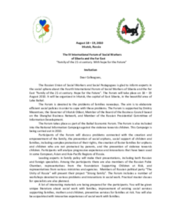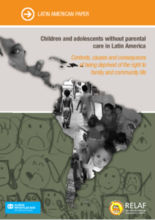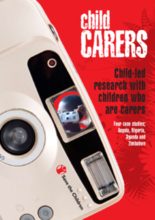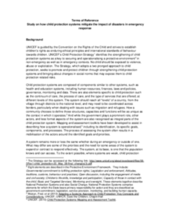Demographic Data
|
Sources: World Bank, UNICEF, UNDP HDR 2015, DHS 2013 |
Displaying 13261 - 13270 of 14555
This compilation provides policymakers, programme managers, non-governmental organizations and others interested in implementing family skills training programmes with a review of existing evidence-based family skills training programmes. Its purpose is to provide details of the content of such programmes, the groups targeted, the materials used and the training implemented, in order to assist users in selecting the programme best suited to their needs and to offer guidance as to the kind of programmes available.
The Russian Union of Social Workers and Social Pedagogues is glad to inform experts in the social sphere about the Fourth International Forum of Social Workers of Siberia and the Far East “Family of the 21-st century. Hope for the Future”.
This paper aims to show different organisations, institutions, governments and civil society the reality facing thousands of children in Latin America. This information can be used as a tool for debating and prioritising the issue as well as promoting constructing good practices and public policies that will improve the wellbeing and chances to develop of children without parental care and/or who are at risk of losing
This report presents key findings from a small-scale pilot research project that explored the experiences and priorities of young people caring for their siblings in sibling-headed households affected by AIDS in Tanzania and Uganda.
This is the summary report on the research phase of a project looking at the needs of child-carers in four African countries; Nigeria, Uganda, Angola and Zimbabwe. The research consisted of a literature review and participatory child-led research in one site in each of the four countries.
This report from the Cambodian Ministry of Health and Ministry of Social Affairs, Veterans and Youth Rehabilitation outlines the efforts of the Cambodian government to address the needs of vulnerable people.
Cette recherche-action part du constat que la situation de guerre civile dans laquelle le Burundi a été plongé depuis 1993, le SIDA et la paupérisation ont eu des conséquences dramatiques sur la vulnérabilité de la population et plus particulièrement sur les enfants. Ainsi, les conséquences sociales et culturelles de l’état de guerre alimentent des processus de marginalisation au sein de la population des moins de 18 ans, favorisent des comportements délictueux, la perte de repères sociaux et compromettent l’insertion naturelle dans la vie sociale.
The purpose of the assignment is to explore the veracity of the hypothesis based on a literature review and specific country case studies exploring whether child protection systems are able to mitigate child protection risks and facilitate responses during and in the immediate aftermath of a natural disaster.
Good practices covered in this publication have sought to address specific constraints and challenges in achieving the Goals, in each country’s context, with specific examples related to care and protection for vulnerable children.
In June 2010, the Committee on the Rights of the Child issued its Concluding Observations to countries reviewed during the Committee's 54th session. This brief summarizes the UNCRC observations regarding alternative care.










